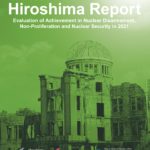Hiroshima Report 2018(8) FMCT
A) Efforts toward commencing negotiations on an FMCT
In the “Decision 2: Principles and Objectives for Nuclear Non-Proliferation and Disarmament” adopted at the 1995 NPT Review and Extension Conference, participating countries agreed on “[t]he immediate commencement and early conclusion of negotiations on a non-discriminatory and universally applicable convention banning the production of fissile material for nuclear weapons or other nuclear explosive devices.” However, substantive negotiations have not yet commenced. The 2017 session of the CD again ended without adopting a program of work that included the establishment of an Ad Hoc Committee on a Fissile Material Cut-Off Treaty (FMCT) negotiation, due to Pakistan’s strong objection, as was the case in previous years. Pakistan has insisted that not just newly produced material but also existing stockpiles of such materials should be subject to the scope of negotiations on a treaty. It also stated that Pakistan would oppose any negotiations unless it could get assurance that India brings its entire civilian nuclear program under the IAEA safeguards.160
China expresses support for the commencement of negotiations on an FMCT prohibiting the future production of fissile material for nuclear weapons, but it does so less actively than the other NWS. Israel has a similar posture. China has stated that it supports “the start by the Conference on Disarmament of substantive work, in a comprehensive and balanced manner, on such important topics as nuclear disarmament, security assurances to non-nuclear weapon States, a treaty banning the production of fissile material for nuclear weapons or other nuclear explosive devices and prevention of an arms race in outer space.”161 This stance is different from those of France, the United Kingdom and the United States, which have insisted that the commencement of negotiations for an FMCT is a top priority at the CD.
For promoting a commencement of negotiations at the CD, various efforts and measures have been attempted. Among them, the 2016 UN General Assembly decided to establish a High-Level FMCT Expert Preparatory Group, “to consider and make recommendations on substantial elements of a future non-discriminatory, multilateral and internationally and effectively verifiable treaty banning the production of fissile material for nuclear weapons or other nuclear explosive devices, on the basis of CD/1299 and the mandate contained therein.” The Group, consisting of experts from 25 countries,162 was scheduled to convene two-week meetings in 2017 and 2018, respectively.163 Its first meeting was held in Geneva in July-August 2017, and participating experts discussed the treaty’s scope, definitions, verification, and legal and institutional arrangements.
Pakistan refused to participate in the Group. At the Informal Consultative Meeting by the Chairperson of the High-level FMCT Expert Preparatory Group in March 2017, Pakistan argued that it could not join any discussion, pre-negotiation, negotiation or preparatory work on the basis of the Shannon Mandate: that is, considering a treaty which only prohibits future production and leaves the existing stocks untouched. Pakistan also argued that: the CD’s role should not be undermined through UNGAled non-universal processes that are divisive and not agreed by consensus; the discussion mandate assigned to the Expert Group can be fulfilled in the CD; the Group cannot address the underlying security concerns that are preventing the CD from reaching consensus on a balanced and comprehensive Programme of Work; and even if the selected 25 members of the Expert Group succeed in garnering consensus among themselves on a treaty related issue, it would not be binding on those states that are not represented in the Group.164
B) Moratoria on production of fissile material for nuclear weapons
Among nuclear-armed states, China, India, Israel, Pakistan and North Korea have not declared a moratorium on the production of fissile material for nuclear weapons. India, Pakistan and North Korea are highly likely to continue producing fissile material for nuclear weapons and expanding production capabilities.165 China is widely considered not to be producing fissile material for nuclear weapons currently.166
None of the nuclear-armed states have declared the amount of fissile material for nuclear weapons which they possess (except the U.S. declassifying the amount of its past production of HEU and plutonium). Estimates by research institutes are summarized in Chapter 3 of this Report.
[160] “Pakistan Wants India’s Entire Nuclear Programme under IAEA Safeguards,” Nation, February 6, 2017, http://nation.com.pk/06-Feb-2017/pakistan-wants-india-s-entire-nuclear-programme-under-iaea-safeguards.
[161] NPT/CONF.2015/32, April 27, 2015.
[162] Algeria, Argentina, Australia, Brazil, Canada, China, Colombia, Egypt, Estonia, France, Germany, India, Indonesia, Japan, Mexico, Morocco, Netherlands, Poland, South Korea, Russia, Senegal, South Africa, Sweden, the U.K. and the U.S.
[163] “Highlevel Fissile Material Cut-off Treaty (FMCT) Expert Preparatory Group,” United Nations Office at Geneva, July 28, 2017, https://www.unog.ch/80256EE600585943/(httpPages)/B8A3B48A3FB7185EC1257B280045DBE3?OpenDocument.
[164] “General Statement by Pakistan,” Informal Consultative Meeting by the Chairperson of the High-level FMCT Expert Preparatory Group, New York, March 2-3, 2017, https://www.unog.ch/80256EDD006B8954/(httpAssets)/BBA938B952963392C12580DC0046E8C0/$file/Pakistan+Statement-GENERAL-FMCT++++Informals-NY-March2017.pdf.
[165] See the Hiroshima Report 2017.
[166] See, for instance, Hui Zhang, “China’s Fissile Material Production and Stockpile,” Research Report, International Panel on Fissile Materials, No. 17 (2017).





